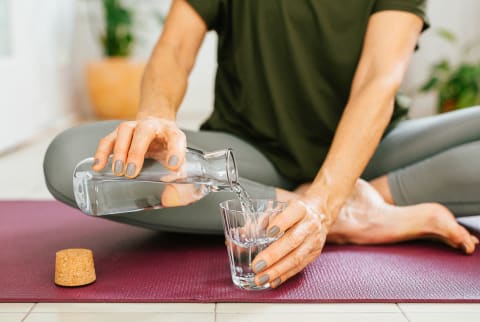Advertisement
4 Things A Urologist Does Every Day For Optimal Pee Health


Peeing may seem like a thoughtless task, but there's actually a lot that goes into maintaining adequate urinary health. Just as creating a gut health and skin care routine is valuable, there are a lot of benefits to creating a pee health routine, too.
Establishing a consistent pee practice may seem a bit, well, odd. But for urologist Vannita Simma-Chiang, M.D., it's pretty standard. While everyone's urinary needs will vary based on health, age, and other factors, this is what Simma-Chiang does every day to optimize her urinary health:
For one, she goes to pee.
This may seem obvious, but the first thing she does in the morning is pee. "I observe the color and quality of urination to get an idea of how hydrated or dehydrated I am," she says.
Later on in the day, she also makes sure to go any time she feels an urgency. "Your body is built to signal to you, so when you have urgency it's a signal," she says. "If you start to ignore it, that sense of urgency will go away and at some point, you'll hold it for so long that it becomes unhealthy."
On average, she says she goes about four times during the day, and she checks the color every time. "It's usually just the right color for me: a light yellow," she says. (Note: On average, a healthy person will pee three to four times per day; any less and you're probably dehydrated.)
She gradually hydrates throughout the day.
To start her day, Simma-Chiang will drink half a cup of water (or a full cup, if the urine was darker yellow) and an iced coffee. "Coffee is definitely part of my morning routine. I need it to wake up," she says.
Coffee is both a natural diuretic and bladder stimulant, which means it can increase the urge to go. To avoid peeing too much, Simma-Chiang tries to moderate her coffee intake to one cup. But hey, we all have those days where one is not nearly enough, and that's OK. Regardless, she stops drinking coffee by noon to ensure high-quality sleep later that night.
Staying hydrated throughout the day is a good way to maintain overall health and, as we all know, affects urine quality. "I don't overdo it with hydration by carrying a gallon water bottle," she says, "but I'll bring two 16-ounce containers, one with water and another with iced tea because I like to sip on a flavored drink during my day."
Instead of guzzling these drinks all at once, she'll work on them gradually throughout the day. "Between patients, phone calls, and procedures—really any time I sit down—I take at least one sip of water," she says.
That said, Simma-Chiang understands this strategy may not work for people who sit all day at work, constantly near their water cups, either overhydrating or too focused on work to pause for a sip. "I'm fortunate enough to have an active job where I'm on my feet pretty much all day, but for people with sedentary jobs, I recommend getting up and walking around, going outside, or even just staring out the window instead of looking at a screen all day," she says.
These short movement and mental breaks can serve as a reminder to take a drink. Plus, being active, getting vitamin D, and spending time in the fresh air are all important for general health, she says.
She keeps the temperature in check.
Throughout the workday, Simma-Chiang is very aware of a room's temperature. "I make sure I'm in a comfortable ambient room—not too cold, not too hot—because that can also affect urination," she says.
A room that's too hot will lead to sweating (aka fluid loss), which can dehydrate you unless you drink enough water to make up for it. And a room that's too cold? "If you're shivering, you're using up energy, creating more heat, and therefore losing more fluid," she explains.
Basically, an overly hot room and an overly cool room will have the same effect—neither of which are great for urinary tract health.
She prioritizes exercise.
"When I get home, exercise is definitely important," she says. According to the American Heart Association, 30 minutes, three times a week1 is the standard recommendation for all adults. "I encourage that for all of my patients," Simma-Chiang says. The schedule is helpful for accountability but still leaves wiggle room for days you come home from work too mentally or physically exhausted to work out, she explains.
"Exercise keeps you healthy overall, and the healthier you are, the healthier your kidney and bladder will be," she explains. "It's just good for you mentally, emotionally, and physically."
Just remember to drink more water while exercising, even if you're not sweating. During exercise, the heart rate will increase, and more blood will pump through the body. This causes the kidneys (which filter the blood) to work overtime. "Drinking more water during this time can assist the body in that filtering process," she explains.
She stops drinking water before bed.
To make sure her sleep is not disrupted by a need to go to the bathroom, Simma-Chiang stops drinking water three to four hours before bed—unless of course, she's thirsty. "Anytime you feel thirsty or your throat is dry, it's a good idea to drink water."
Going to pee directly before bed is another good way to (hopefully) prevent an unwanted wake-up call.